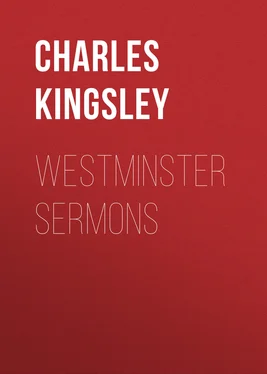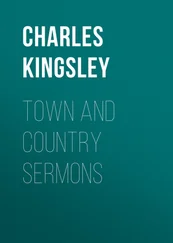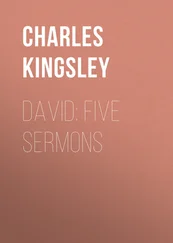Charles Kingsley - Westminster Sermons
Здесь есть возможность читать онлайн «Charles Kingsley - Westminster Sermons» — ознакомительный отрывок электронной книги совершенно бесплатно, а после прочтения отрывка купить полную версию. В некоторых случаях можно слушать аудио, скачать через торрент в формате fb2 и присутствует краткое содержание. Жанр: foreign_prose, foreign_religion, Философия, foreign_psychology, foreign_antique, на английском языке. Описание произведения, (предисловие) а так же отзывы посетителей доступны на портале библиотеки ЛибКат.
- Название:Westminster Sermons
- Автор:
- Жанр:
- Год:неизвестен
- ISBN:нет данных
- Рейтинг книги:4 / 5. Голосов: 1
-
Избранное:Добавить в избранное
- Отзывы:
-
Ваша оценка:
- 80
- 1
- 2
- 3
- 4
- 5
Westminster Sermons: краткое содержание, описание и аннотация
Предлагаем к чтению аннотацию, описание, краткое содержание или предисловие (зависит от того, что написал сам автор книги «Westminster Sermons»). Если вы не нашли необходимую информацию о книге — напишите в комментариях, мы постараемся отыскать её.
Westminster Sermons — читать онлайн ознакомительный отрывок
Ниже представлен текст книги, разбитый по страницам. Система сохранения места последней прочитанной страницы, позволяет с удобством читать онлайн бесплатно книгу «Westminster Sermons», без необходимости каждый раз заново искать на чём Вы остановились. Поставьте закладку, и сможете в любой момент перейти на страницу, на которой закончили чтение.
Интервал:
Закладка:
Oh, my friends, those who believe, or fancy that they believe such things, must be able to do so only through some peculiar conformation either of brain or heart. Only want of imagination to conceive the consequences of such doctrines can enable them, if they have any love and pity for their fellow-men, to preach those doctrines without pity and horror. They know not, they know not, of what they rob a mankind already but too miserable by its own folly and its own sin; a mankind which, if it have not hope in God and in Christ, is truly—as Homer said of old—more miserable than the beasts of the field. If their unconscious conceit did not make them unintentionally cruel, they would surely be silent for pity’s sake; they would let men go on in the pleasant delusion that there is a living God, and a Word of God who has revealed Him to men; and would hide from their fellow-creatures the dreadful secret which they think they have discovered—That there is none that heareth prayer, and therefore to Him need no flesh come.
Men take up with such notions, I believe, most generally in days of comfort, ease, safety. They find the world so well ordered outwardly, that it seems able enough to go on its way without a God. They have themselves so few sorrows, struggles, doubts, that they never feel that sense of helplessness, of danger, of ignorance, which has made the hearts of men, in every age, yearn for an unseen helper, an unseen deliverer, an unseen teacher.
And so it is—and shameful it is that so it should be—that the more God gives to men, the less they thank Him, the less they fancy that they need Him: but take His bounties, as they take the air they breathe, unconsciously, and as a matter of course.
And therefore adversity is wholesome, danger is wholesome; so wholesome, that in all ages, as far as I can find, the godliest, the most moral, the most manful, and therefore the really happiest and most successful nations or communities of men, have been those who were in perpetual danger, difficulty, struggle; and who have thereby had their faith in God called out; who have learned in the depth, to cry out of the depth to God; to lift up their eyes unto the Lord, and know that their help comes from Him.
I know a village down in the far West, where the 121st Psalm which I just quoted, was a favourite, and more than a favourite. Whenever it was given out in church—and the congregation used often to ask for it—all joined in singing it, young and old, men and maidens, with an earnestness, a fervour, a passion, such as I never heard elsewhere; such as shewed how intensely they felt that the psalm was true, and true for them. Of all congregational singing I ever heard, never have I heard any so touching as those voices, when they joined in the old words they loved so well.
Sheltered beneath the Almighty wings
Thou shall securely rest,
Where neither sun nor moon shall thee
By day or night molest.
At home, abroad, in peace, in war,
Thy God shall thee defend;
Conduct thee through life’s pilgrimage
Safe to thy journey’s end.
Do you fancy these people were specially comfortable, prosperous folk, who had no sorrows, and lived safe from all danger, and therefore knew that God protected them from all ill?
Nothing less, my friends, nothing less. There was hardly a man who joined in that psalm, but knew that he carried his life in his hand from year to year, that any day might see him a corpse—drowned at sea. Hardly a woman who sang that psalm but had lost a husband, a father, a brother, a kinsman—drowned at sea. And yet they believed that God preserved them. They were fishers and sailors, earning an uncertain livelihood, on a wild and rocky coast. A sudden shift of wind might make, as I knew it once to make, 60 widows and orphans in a single night. The fishery for the year might fail, and all the expense of boats and nets be thrown away. Or in default of work at home, the young men would go out on voyages to foreign parts: and often never came back again, dying far from home, of fever, of wreck, of some of the hundred accidents which befal seafaring men. And yet they believed that God preserved them. Surely their faith was tried, if ever faith was tried. But as surely their faith failed not, for—if I may so say—they dared not let it fail. If they ceased to trust God, what had they to trust in? Not in their own skill in seamanship, though it was great: they knew how weak it was, on which to lean. Not in the so-called laws of nature; the treacherous sea, the wild wind, the uncertain shoals of fish, the chances and changes of a long foreign voyage. Without trust in God, their lives must have been lives of doubt and of terror, for ever anxious about the morrow: or else of blind recklessness, saying, “Let us eat and drink, for to-morrow we die.” Because they kept their faith in God, their lives were for the most part lives of hardy and hopeful enterprise; cheerful always, in bad luck as in good; thankful when their labours were blest with success; and when calamity and failure came, saying with noble resignation—“I have received good from the hand of the Lord, and shall I not receive evil? Though He slay me, yet will I trust in Him.”
It is a life like theirs, mixed with danger and uncertainty, which most calls out faith in God. It is the life of safety and comfort, in which our wants are all supplied ready to our hand, which calls it out least. And therefore it is that life in cities, just because it is most safe and most comfortable, is so often, alas, most ungodly, at least among the men. Less common, thank God, is this ungodliness among the women. The nursing of the sick; the cares of a family, often too sorrows, manifold and bitter, put them continually in mind of human weakness, and of their own weakness likewise. Yes. It is sorrow, my friends, sorrow and failure, which forces men to believe that there is One who heareth prayer, forces them to lift up their eyes to One from whom cometh their help. Before the terrible realities of danger, death, bereavement, disappointment, shame, ruin—and most of all before deserved shame, deserved ruin—all the arguments of the conceited sophist melt away like the maxims of the comfortable worldling; and the man or woman who was but too ready a day before to say, “Tush, God will never see, and will never hear,” begins to hope passionately that God does see, that God does hear. In the hour of darkness; when there is no comfort in man nor help in man, when he has no place to flee unto, and no man careth for his soul: then the most awful, the most blessed of all questions is: But is there no one higher than man to whom I can flee? No one higher than man who cares for my soul and for the souls of those who are dearer to me than my own soul? No friend? No helper? No deliverer? No counsellor? Even no judge? No punisher? No God, even though He be a consuming fire? Am I and my misery alone together in the universe? Is my misery without any meaning, and I without hope? If there be no God: then all that is left for me is despair and death. But if there be, then I can hope that there is a meaning in my misery; that it comes to me not without cause, even though that cause be my own fault. I can plead with God like poor Job of old, even though in wild words like Job; and ask—What is the meaning of this sorrow? What have I done? What should I do? “I will say unto God, Do not condemn me; shew me wherefore thou contendest with me. Surely I would speak unto the Almighty, and desire to reason with God.”
“I would speak unto the Almighty, and desire to reason with God.” Oh my friends, a man, I believe, can gain courage and wisdom to say that, only by the inspiration of the Spirit of God.
But when once he has said that from his heart, he begins to be justified by faith. For he has had faith in God; he has trusted God enough to speak to God who made him; and so he has put himself, so far at least, into his just and right place, as a spiritual and rational being, made in the image of God.
Читать дальшеИнтервал:
Закладка:
Похожие книги на «Westminster Sermons»
Представляем Вашему вниманию похожие книги на «Westminster Sermons» списком для выбора. Мы отобрали схожую по названию и смыслу литературу в надежде предоставить читателям больше вариантов отыскать новые, интересные, ещё непрочитанные произведения.
Обсуждение, отзывы о книге «Westminster Sermons» и просто собственные мнения читателей. Оставьте ваши комментарии, напишите, что Вы думаете о произведении, его смысле или главных героях. Укажите что конкретно понравилось, а что нет, и почему Вы так считаете.












